


Cleaning Your Home The Eco-Friendly Way

In a world that's increasingly environmentally conscious, the use of natural cleaning solutions is gaining momentum as a sustainable and healthier alternative to traditional chemical-laden products. These natural cleaning solutions are not only effective but also safe for your health and kind to the environment. In this article, we'll explore the benefits and methods of using natural cleaning solutions to maintain a clean and eco-friendly home.
The Benefits Of Natural Cleaning Solutions
Healthier Indoor Air Quality: Many conventional cleaning products release volatile organic compounds (VOCs) into the air, which can lead to respiratory issues and allergies. Natural cleaning solutions, in contrast, are typically free from these harmful chemicals, resulting in cleaner indoor air.
Reduced Health Risks: Natural cleaning products are less likely to cause skin irritations, allergies, or other health problems associated with chemical exposure.
Eco-Friendly: Natural cleaning solutions are gentle on the environment. They don't contribute to water pollution when washed down drains, and they reduce the production and disposal of harmful chemicals.
Versatility: Natural ingredients like vinegar, baking soda, and lemon juice can be used in a variety of cleaning tasks, reducing the need for multiple specialized cleaning products.
Common Natural Cleaning Solutions
Vinegar: White vinegar is a versatile natural cleaner that can be used to disinfect surfaces, remove stains, and even clean glass.
Baking Soda: Baking soda is an effective abrasive cleaner, perfect for scrubbing surfaces, deodorizing, and eliminating stains.
Lemon Juice: Lemon juice is a natural disinfectant that also leaves behind a fresh, citrus scent. It's great for cutting through grease and grime.
Essential Oils: Many essential oils, such as tea tree oil, lavender oil, and eucalyptus oil, have natural cleaning and disinfecting properties. They can be added to homemade cleaning solutions for added fragrance and antibacterial power.
Olive Oil: Olive oil can be used to clean and polish wooden surfaces and stainless steel appliances.
Methods Of Using Natural Cleaning Solutions
All-Purpose Cleaner: Create a basic all-purpose cleaner by mixing equal parts water and white vinegar. Add a few drops of your favorite essential oil for a pleasant scent.
Bathroom Cleaner: For cleaning bathrooms, make a paste with baking soda and water to scrub tiles, tubs, and sinks.
Glass Cleaner: Mix equal parts water and vinegar to create a natural glass cleaner. Spray it on windows and mirrors and wipe them clean with a lint-free cloth.
Kitchen Degreaser: Combine equal parts water and lemon juice to clean kitchen surfaces and cut through grease.
Wood Polish: Mix olive oil and lemon juice to create a natural wood polish that works wonders on wooden furniture.
Getting Started With Natural Cleaning Solutions
To start incorporating natural cleaning solutions into your cleaning routine, begin by assessing your current cleaning products. Identify any chemical-based cleaners you use and replace them with natural alternatives. Invest in reusable and eco-friendly cleaning tools like microfiber cloths and mop heads. When purchasing new cleaning products, read labels carefully and choose those that are certified as non-toxic and environmentally friendly.
Natural cleaning solutions are not just a trend; they are a responsible and sustainable way of maintaining a clean home. By embracing these natural alternatives, you can create a safer, healthier, and more environmentally friendly living space. Your home can be spotless, and you can contribute positively to the well-being of your family and the planet.
Creative Landscaping Ideas
 2. Xeriscaping: For areas with limited water resources, xeriscaping is the way to go. This landscaping approach focuses on drought-tolerant plants, efficient irrigation systems, and mulching to conserve water. The result is a low-maintenance garden that thrives in arid conditions.
2. Xeriscaping: For areas with limited water resources, xeriscaping is the way to go. This landscaping approach focuses on drought-tolerant plants, efficient irrigation systems, and mulching to conserve water. The result is a low-maintenance garden that thrives in arid conditions.
3. Edible Landscaping: Why not turn your outdoor space into a source of fresh produce? Edible landscaping incorporates fruits, vegetables, and herbs into your garden design. Raised beds, vertical gardens, and fruit trees can create a beautiful and functional space that provides your family with fresh, homegrown produce.
4. Zen Gardens: Zen gardens are known for their minimalist and tranquil designs. These peaceful spaces often feature sand or gravel raked into patterns, along with carefully placed rocks and a few select plants. They provide a sense of serenity and are perfect for meditation or relaxation.
Making The Most Of Your Compact Living
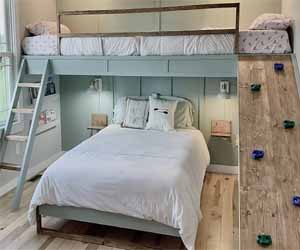 The Benefits Of Small Space Living
The Benefits Of Small Space Living
Before delving into the intricacies of small space planning, it's essential to understand the advantages of choosing a compact living arrangement.
Simplicity: Small homes encourage a minimalist lifestyle, reducing clutter and allowing you to focus on what truly matters.
Eco-Friendly: Smaller homes typically have a smaller environmental impact, as they consume fewer resources for heating, cooling, and maintenance.
Cost-Effective: Compact spaces are generally more affordable, both in terms of initial purchase or rent and ongoing utility costs.
Less Maintenance: With less square footage, there's less space to clean and maintain, freeing up your time for other pursuits.
Exploring The Benefits Of Solar Energy
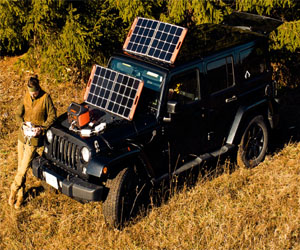 2. Reduced Electricity Bills
2. Reduced Electricity Bills
Solar panels allow homeowners and businesses to generate their electricity, which can lead to substantial cost savings on their electricity bills. By producing your electricity, you can significantly reduce or even eliminate your reliance on traditional utility providers.
3. Energy Independence
With solar panels on your roof or property, you gain a degree of energy independence. You are less reliant on the grid, which can be especially advantageous during power outages. Solar power systems, combined with energy storage solutions like batteries, can provide a consistent supply of electricity even when the sun isn't shining.
4. Increased Property Value
Homes and commercial properties equipped with solar panels often see an increase in their market value. Solar panels are viewed as attractive assets, and many potential buyers are willing to pay a premium for a property with solar installations.
5. Government Incentives
Many governments worldwide offer incentives, tax credits, and rebates to encourage the adoption of solar energy. These financial perks can make solar installations more accessible and affordable for homeowners and businesses.
6. Low Operating Costs
Once installed, solar panels have minimal operating and maintenance costs. Regular cleaning and occasional inspections are usually all that's needed to keep the system running efficiently. This low-maintenance feature makes solar energy a cost-effective long-term investment.
A Glimpse Into Tomorrow's Living Spaces
 A Symphony Of Automation And Connectivity
A Symphony Of Automation And Connectivity
The home of the future is a symphony of automation and connectivity. It's a place where technology seamlessly integrates into every aspect of daily life. From the moment you wake up, your home is ready to assist you. Imagine a home where the lights gradually brighten to mimic the natural sunrise, and your coffee maker starts brewing your morning cup as your alarm goes off. This level of automation is now possible thanks to smart home technologies.
Smart Home Upgrades
One of the key elements of the home of the future is the plethora of smart home upgrades available today. These upgrades have revolutionized the way we interact with our living spaces. From intelligent thermostats that adapt to our preferences to security systems that keep a vigilant eye on our property, these technologies hold the potential to elevate our homes into spaces of the future.
Personalized Living
The home of the future is all about personalization. With smart technologies, your home can learn your habits and adapt to your preferences. For example, smart thermostats can create a tailored heating and cooling schedule based on your daily routines. This not only enhances your comfort but also leads to energy savings, making your home more efficient and eco-friendly.
Security And Peace Of Mind
Home security is a top priority for homeowners, and the home of the future takes it to the next level. Smart security systems provide real-time monitoring, allowing you to keep a watchful eye on your property, whether you're at home or away.


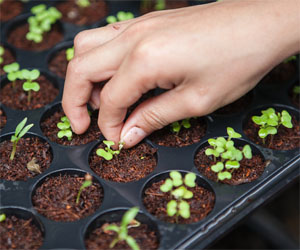

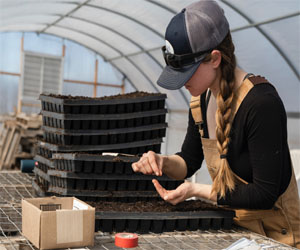

Leading The Way To Self-Sufficiency And Sustainability
 Off-grid pioneers are adventurers who have chosen to break free from the shackles of modern civilization, to take a step back from the hustle and bustle of urban life, and to reconnect with the natural world. They often opt for remote locations, nestled in the heart of nature, where they build sustainable homes, harness renewable energy sources, and cultivate their own food. Their goal is to reduce their ecological footprint and live in harmony with the environment.
Off-grid pioneers are adventurers who have chosen to break free from the shackles of modern civilization, to take a step back from the hustle and bustle of urban life, and to reconnect with the natural world. They often opt for remote locations, nestled in the heart of nature, where they build sustainable homes, harness renewable energy sources, and cultivate their own food. Their goal is to reduce their ecological footprint and live in harmony with the environment.
One of the defining characteristics of these pioneers is their resourcefulness. They are masters of ingenuity, using their creativity to overcome challenges that come with living off the grid. From constructing eco-friendly homes using natural materials to repurposing everyday items for new purposes, they exemplify the art of making do with what they have.
Adaptability is another key trait of off-grid pioneers. They understand that living off the grid requires flexibility and the ability to embrace change. These individuals are constantly learning new skills, from foraging for wild edibles to harnessing solar or wind energy, and are quick to adapt to the dynamic conditions of life in the wilderness.
Moreover, these pioneers are committed to reducing their environmental impact. They use renewable energy sources like solar panels and wind turbines, collect rainwater, and practice composting and recycling. By doing so, they serve as a shining example of eco-conscious living, demonstrating how it's possible to minimize harm to the planet even while residing in remote areas.
Off-grid pioneers are more than just isolated individuals; they often form tight-knit communities, where like-minded individuals come together to share knowledge, resources, and a sense of camaraderie.
Illuminating Our Path To Sustainability
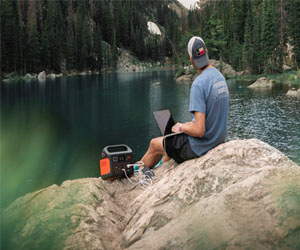 Solar energy holds immense promise for the future for several compelling reasons:
Solar energy holds immense promise for the future for several compelling reasons:
Inexhaustible Resource: The sun, our ultimate energy source, is an almost inexhaustible and free resource. It continually emits an enormous amount of energy, more than humanity could ever consume.
Environmental Benefits: Solar power is one of the cleanest and most environmentally friendly energy sources available. It produces no greenhouse gas emissions, air pollution, or water usage, making it a key player in mitigating climate change.
Global Accessibility: Solar energy is accessible virtually everywhere on the planet. As long as there is sunlight, solar panels can be installed and harnessed, making it a democratic energy source.
Technological Advancements: Ongoing advancements in solar technology continue to drive down costs and improve efficiency, making it increasingly attractive and affordable for individuals, businesses, and governments.